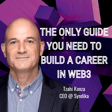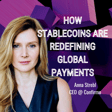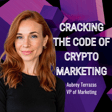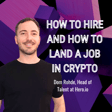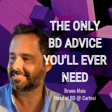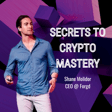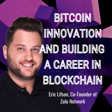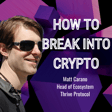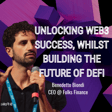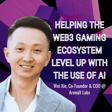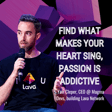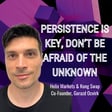Introduction to Will Belmont
00:00:02
Speaker
Will, welcome to the show. How are Thank you very much. I'm really good, thank you. It's nice to be here. Good stuff. Thanks for joining me. Will, for people who don't know who you are, could you give us a bit of an introduction, please?
Professional Journey in Tech
00:00:14
Speaker
Sure. I'm Will Belmont. I have been in the tech space for, I guess, 25 years now professionally, doing everything from engineering to engineering leadership.
00:00:28
Speaker
and many of the things that I probably shouldn't be doing like marketing and product and things like that um along the way. I've worked in like lots of different types of organizations from startups to kind of multinational corporation type stuff.
00:00:47
Speaker
Yeah, so I'm based in the UK but was born in California so I'm sort bi-continental I guess.
Education and Early Career
00:00:59
Speaker
nice s will um Well, Will, if you could take us back to the the start of your career, could you talk us through the journey so far? Yeah, sure. So I graduated from the University of Edinburgh in Scotland.
00:01:14
Speaker
um I studied computer science and although the AI then was quite different from how it is now, I guess. The principles are the same, but don't know that much of what I learned there with still applies.
00:01:27
Speaker
um And i out of out of uni, I joined a consulting firm doing mostly public sector consulting. um And we worked on all kinds of stuff, but a lot of educational type stuff doing exam results processing and stuff like that. um And then we also launched a product business,
00:01:49
Speaker
um which I led. And sort of over the course of, I guess I was there for seven years, I want to say. And over that course, I kind of progressed from being a graduate engineer to ultimately being technical director at the business.
00:02:02
Speaker
um It was quite a small business, so I don't know, I can't remember exactly, but I think we were like 30 engineers at one point.
Engineering Roles at TomTom and ScottLogic
00:02:10
Speaker
But that was kind of the peak. ah And then from there, I left and I went to join TomTom, the sat-nav company, and worked there as just a pure engineer for, I guess, three years doing engineering.
00:02:24
Speaker
all kinds of stuff, on-device stuff. I did a bunch of map map processing, reverse engineering stuff, really interesting technical problems. um And then I got the opportunity to join a company called ScottLogic, who are, um or at the at the time, they were a pure financial software consulting firm. So they worked with, I think, I want to say like seven of the 10 largest investment banks doing various software projects.
00:02:53
Speaker
um But I actually joined them to run their product division. They had been working on a product that they wanted to get out the door and they couldn't quite figure out how to do it. They never quite got it over the line. And so I came on board to help them with that. And then we spun out another product venture from there. And I did that for about five years.
00:03:13
Speaker
um And then i needed a break.
Acting Career and Skills for Tech Leadership
00:03:17
Speaker
And so I still did consulting on the side doing consulting. health tech stuff. um But I moved to the States and became an actor for six years, I want to say, five years, and an acting teacher, um which had, it was a great experience. And it actually, well, I'm sure we'll get into this a little bit later, but it gave me a bunch of skills that I didn't know I needed that have really helped and as I've come back to tech and leadership and things like that.
Return to Tech and Blockchain Roles
00:03:50
Speaker
um And then the pandemic hit, you know, in the entertainment industry, shut down like everything else. And I got back into tech having recharged my batteries and ah joined Exodus, which, you know, the multi-chain self-custody wallet in the blockchain space.
Challenges in Corporate Politics
00:04:08
Speaker
um And I worked there for a while. And then from there, I joined sort of a series of startups, you in social media and then most recently I was the CTO at a company called Payman which um sort of lives at the intersection of AI and and payments fintech space yeah and so that's what I did and now I'm back to taking a break
00:04:34
Speaker
just between things right now yeah that sounds cool ah it sounds super super varied really tons of different industries like working um yeah all all over the place I guess when it comes to industries and then yeah taking the break to to do some acting as well I've definitely got some questions about that for so short and for sure were there any challenges throughout that that journey that really surprised you that you weren't expecting I don't know if I don't know if I wasn't
00:05:11
Speaker
expecting the challenges, but there were definitely things that I didn't know we're going to be a thing.
Navigating Corporate and Startup Dynamics
00:05:18
Speaker
for For example, I sort of in my, I guess, naive younger self didn't realize that corporate politics were a thing, right? That I would have to navigate people having self-interests.
00:05:32
Speaker
You know, it sort of seeing seemed obvious to me that we should all be rooting for, you know, whatever's best for the company, you know, best idea wins type stuff. um And it it came as, I mean, in retrospect, stupidly, but but it came as a surprise that not everybody feels that way.
00:05:49
Speaker
um And so that was a learning curve to have to like develop those skills of you know managing upwards and and managing politics and you know fostering relationships and so on that in order to overcome those things rather than just yeah to build the best thing possible.
00:06:11
Speaker
So that was definitely one. Just on that, if I can just interject. Did you find that that was different when you were working in the AI startup world, in the blockchain world, or in the the more corporate ah side of things that you might have done? like did you Did you notice any difference?
00:06:31
Speaker
um I noticed difference in the types in the types of
00:06:38
Speaker
personal self-interest, but not really in in their presence or not presence. I generally find in startups, it's easier to navigate those things just because there's a smaller network, right? There's there's fewer people.
00:06:50
Speaker
um But um no, I mean, having worked certainly and in at TomTom when I was there, I can't remember what the number of people was, but it was in the thousands.
00:07:03
Speaker
And there... that that idea of being a small cog in a big machine definitely was difficult in some senses because just trying to affect any change becomes quite challenging.
00:07:18
Speaker
um You know, a systemic change, not localized change. but um Whereas, for example, at Exodus, there was ah there was an equal amount of that kind of um i don't know I don't know whether to call it empire building, but but I think maybe because of because of the way the blockchain industry is, having come from sort of ah an anarchic counterculture place, um there was a lot of strongly held opinions and they weren't always totally aligned.
00:07:56
Speaker
And so rather than it being purely political, it was sort of an identity thing as much as anything. It was just that certain people believed it should be this way and certain other people believed it should be that way.
00:08:10
Speaker
and And neither side were really willing to to shift.
Self-awareness and Overcoming Bias
00:08:15
Speaker
So there was a lot of that. Yeah. Which very interesting. Yeah. And it's it's not even that those things are bad necessarily, you know, like they just are. It's just a ah challenge you have to navigate and figure out how to, how to work around.
00:08:32
Speaker
Yeah, sure. I think that's always, yeah, those things are always going to be there. I guess that's why people um have their own careers and they have their own aspirations and their own goals because they always have some kind of self-interest in what they're doing, right?
00:08:44
Speaker
I guess otherwise they wouldn' yeah they wouldn't be on that journey and they wouldn't be doing it. Right, um right. and And I guess that maybe slightly better.
00:08:54
Speaker
Sorry, I was just going to say when when when you have ambitions, naturally you're quite passionate and when you're passionate, you know you you want to do things the way you feel passionate about them so you in a way it's a good thing it's just something that you have to navigate yeah no you're right no you're right um yeah looking back on places that i've worked as well uh i've never really thought about uh that too much before but actually when you do start to think about it you I guess those different self-interests become quite obvious when you actually sit down start to think about why someone might have done something or focused on certain area or pushed a certain idea or whatever it might be.
00:09:39
Speaker
um Yeah. ah um completely Yeah, completely get that. um Was there anything else that ah jumps out to you? Yeah, I think the other big challenge that I didn't know was a challenge at the time, and and it's sort of only much later on reflection that I realized it, is just how much my own shortcomings, you know, whether it's, i you know, baggage from childhood or, you know, my strengths and weaknesses, my biases, my and prejudices impact my ability to do my job.
00:10:18
Speaker
and do it well. And as I've kind of matured, I guess, and worked on myself and developed some of those skills and and and capabilities and a little bit more self-awareness, it's really leveled up how well I can do what I do.
00:10:36
Speaker
And when I was young, I just didn't even know that was a thing. Like, i I didn't know I had the weaknesses, let alone that they were impacting my work.
Leadership vs. Management
00:10:45
Speaker
And so that's been... I think an ongoing challenge and probably a challenge that I will be grappling with for the rest of my career, i would imagine.
00:10:58
Speaker
Yeah, for sure. Very interesting. Yeah. Yeah, I think so. I think, um, it's challenge in itself to have the ah self-awareness to notice any shortcomings or notice anything that is kind of impacting your day-to-day work, right?
00:11:14
Speaker
um It's, um yeah, I think everyone everyone has it. Not everyone recognizes those certain behaviors, I guess, in in themselves and how it's affecting them and that kind of thing.
00:11:27
Speaker
um Yeah. But... time Could you, obviously you've you've worked at some pretty pretty cool places ah so far in in your career.
00:11:37
Speaker
um Could you give us a crash course on what makes a successful director of engineering, CTO, engineering leader?
00:11:51
Speaker
I could certainly try. um I think the first thing we'll to maybe just point out in case it's not clear is that director of engineering and CTO can be quite different jobs depending on the organization you're in.
00:12:06
Speaker
It's not always the case. Sometimes they're just different seniorities of the same thing. But a director of engineering almost always in my experience is a pure or primarily people leadership job.
00:12:23
Speaker
So um it's about people in process. Whereas a CTO can be that, but it can also be a purely technical leadership job of I'm going to define the technical strategy and architecture for our system and somebody else will deal with the people.
00:12:40
Speaker
um So it it depends a little bit on what kind of an organization you're in. I'll maybe focus on the people process side of it since that's the overlap potentially, initially anyway.
00:12:54
Speaker
and And within that, what I would say is, in my mind, and I don't know if there's any sort of um scholastic or or academic validity to this, but but in my mind, I separate the concept of leadership and management.
00:13:12
Speaker
I think about leadership as if you have a group of people and you're trying to lead them somewhere, right? The leadership part is pointing off into the distance and saying, that's where we want to go. And here's why why we want to go there.
00:13:25
Speaker
Right over there on the horizon is an awesome place we can build our village. Right. Because there's water in this food. Great. Let's go. The management part is figuring out how we get from here to there.
00:13:36
Speaker
Right. Planning the route. Where are we to stop? How are we going to do the logistics? You all that stuff. So in a business sense, I find that leadership is about motivating people,
00:13:49
Speaker
describing the purpose or the vision, where are we headed, what's the big grand idea?
00:13:56
Speaker
And why, right? Why are we trying to get there? What what is it about that place that's great? um Whether it's, you know, we want to take Tesla, we we want to accelerate the humanities transition to sustainable energy, right?
00:14:14
Speaker
I think that's something along those lines is what their vision is. And it's pretty easy to like paint that ah lot far off distance kind of vision and, you know, excite people about getting there because it's ah it's a cool thing, right?
00:14:28
Speaker
There's all these benefits that we're going to get But then you have to figure out how to get there, right? And that's where, in my mind, management takes over and it's like, okay, well, we're going to need milestones along the way and we're going to need some sort of plan and like we need to organize ourselves somehow.
00:14:45
Speaker
And and I think in general, as you go from as you start taking kind of senior engineering leadership positions of any kind, the first goal, it it tends to bias towards management initially and more towards leadership later.
00:15:02
Speaker
So that blend of which of those two things you're doing at any given time transitions from management towards leadership over time or over seniority. um I think to some degree, you're always doing both.
00:15:17
Speaker
Like it's not like, okay, I don't have to deal with management stuff anymore or, you know, I don't have to think at all about leadership. It's not that, but it's just the bias tends to, like I spend more of my time doing leadership things and less doing management stuff, the the more senior I get.
00:15:32
Speaker
And so for me, kind of when you get to director of engineering and VP, CTO, they tend to be quite more heavily leaning towards leadership stuff.
00:15:47
Speaker
at least in my experience. um And within that, I think the first thing to say about leadership, which was a fallacy of mine, and I think a lot of people, is that there's this feeling, probably imbued by imposter syndrome, that when i when I take on a leadership responsibility, I have to have all the answers.
00:16:08
Speaker
I have to tell people how it should be. And I think it's good to just dispel that illusion initially because it's not true.
00:16:19
Speaker
you do have to have some idea of where you want to go, I think, because that's kind of what, you know, as I described before, that's kind of the point of leadership is to head yonder, folks.
00:16:32
Speaker
um But I don't think you have to know all of the answers. And I think a lot of the pitfalls people fall into when taking on these roles for the first time is that they do try and have all the answers.
00:16:44
Speaker
They tell people how it should be. And I think a different way of thinking about it is your job as a leader is to motivate people and to enable them to do their best work.
00:16:58
Speaker
Enable them to find the answers for you. And find people who can help you in getting to the answers. Because a lot of times, not a lot of times, some of the time you will find people who are not interested in that.
00:17:10
Speaker
They don't want to help you get the answers. They want to be told what to do. And that's okay, but they're not the people that you can rely on to solve your problem. Either you need to put them under management and have the manager tell them what to do, or you just need to find different people.
00:17:25
Speaker
um So I think that's really where most of my energy goes when I'm in a leadership position is finding the right people, organizing them in an efficient way, figuring out a way that we can work together, and making sure everybody can take part beyond just telling them where I think we need to go.
00:17:46
Speaker
And usually from an engineering point of view, where we need to go is predominantly informed by the rest of the organization anyway, right?
Choosing Technology Stacks Wisely
00:17:56
Speaker
Be it executive or product or sales or marketing, they will tell you where where they want to go.
00:18:04
Speaker
And it's your your job really to just execute that and like give them the tools to get there. Not entirely, but a large-ish part of of the job is is that. I
00:18:18
Speaker
i think the the only other a piece that I would kind of throw into the blend is is keeping an eye on the big picture.
00:18:29
Speaker
Because what I've found, and again, this is maybe slightly more lower level than you were you were asking about, but what I've found is that it's very easy to get tunnel vision, even as a leader.
00:18:42
Speaker
It's like, I've stated this goal, therefore, we must do these things, therefore, here's the sequence of work. and And you can often lose sight of the fact that you might be solving the wrong problem.
00:18:55
Speaker
but You can get very myopic about making it efficient to solve the problem and and forget to step back and you know double check that we're actually solving the right problem.
00:19:07
Speaker
or solving a problem at all. right There is so much software in the world that doesn't actually solve a problem.
00:19:17
Speaker
And it's easy to see how you get there, right? Like organizations are told to do a certain thing or parts of organizations or departments or teams, and they go off and build that thing, not realizing that the thing isn't actually needed.
00:19:27
Speaker
Like we could just delete all that stuff and do it this other way. And then we don't need to write any of that software and everything's much simpler. right So, um And then like on this, the technical leadership side, like if you steer more towards the CTO or technical architect or, you know, principal engineer or whatever, like that senior technical angle, I think it's more about defining how we build the thing, right?
00:19:56
Speaker
What's the architecture? What technologies are we using? What are working practices? What's important in software? What's not? And the there's no right answer there.
00:20:07
Speaker
Like, the The only observation I would make about that after 25 years of doing this is that CPUs, computers, largely are the same now as they were 25 years ago.
00:20:21
Speaker
right It's still largely the same instruction set. um that They've had evolutions, but it's basically the same thing. And yet technology stacks reinvent themselves every two to three years. right There's no new framework, a new web thing, a new blah, blah, blah. right um And it's very easy to get lured into the new shiny thing.
00:20:44
Speaker
But especially as a senior engineering leader, it's really important to think about the long-term consequences of that, of, well, how well supported is this thing? How easy is it going to be for me to find talent that knows about this thing?
00:20:58
Speaker
um How supported is this thing, right? How big an ecosystem is there around it? Is it going to go away in the next five years? What if I mean, and you can look back the last 10 years and see all of the like hot new hype things that came along and then died.
00:21:17
Speaker
Right. Or even if they didn't die, they just become much less significant. For a while there, i guess in the mid 2000s or something, oh maybe it was 2010s. um You know, Ruby on Rails was the thing.
00:21:32
Speaker
it It was going to solve all the problems. It was how you should build applications. Now, relatively few people comparatively build on Ruby on Rails, right? So these things come and go, and it's very easy to get lured into jumping on the new shiny thing and dismissing the old proven thing.
00:21:52
Speaker
And sometimes that's fine, but a lot of the time it's probably not as big a shift as you think it is.
00:22:03
Speaker
Nice. I like that. Well, yeah, thank you for for talking us through that. I know that's quite a difficult thing probably to give 25-year career crash course in a couple of minutes.
00:22:14
Speaker
I appreciate you ah trying to condense that. Yeah. I think the only other thing to throw in the mix is is that there is no one size fits all. Like all of these things need to be tailored to the organization, the domain you're the people you have around you, um your experiences, your strengths and weaknesses. Like
Career Tools: Pragmatism and Ownership
00:22:33
Speaker
there's there's no right way to do any of it.
00:22:35
Speaker
And anybody that tells you there is, is probably lying um or soon to be a trillionaire. So i you know, take it all with a grain of salt. And the biggest thing I have relied on in my career throughout is um
00:22:59
Speaker
ah a willingness to take ownership and a healthy dose of common sense slash pragmatism.
Understanding the Blockchain Industry
00:23:07
Speaker
That's basically the big two tools that I use.
00:23:13
Speaker
ah like that. like that. I'm going yeah, going to say that on board myself, actually. that's ah That's a good way of looking at it. Excellent.
00:23:22
Speaker
Talking, you mentioned then about going back couple of a couple of seconds to where you were talking about technology and new technology and the new shiny thing ah that comes up.
00:23:34
Speaker
You've been fortunate to work across a number of different industries, obviously the blockchain industry being one of them, which as you know, is is close to my heart. I tend to, to any help um web three and blockchain projects with with recruitment.
00:23:48
Speaker
um As someone who has worked in the industry, worked out of it, worked in different spaces, what's something you think people need to be aware of before going into to the Web3 space or to the blockchain industry with this new technology, new shiny thing, as you were saying?
00:24:11
Speaker
Yeah, I think, I mean, i sort of alluded to it a little bit already, which is that but blockchain, you know Bitcoin essentially, which was the foundational piece of blockchain as we know it now, was really invented um following the 2008 financial collapse. It was a ah bid to say, okay, we need a new way of doing this because the current establishment system is not working.
00:24:42
Speaker
And so by its outset, it was sort of a counterculture thing. It was a, let's disrupt the existing system completely. Let's break it.
00:24:53
Speaker
um And that's probably a really good thing. It's a really healthy thing. But in my experience, it also attracts a lot of people that think that way, right? Naturally, like people that get excited about blockchain are the people that are excited about breaking the existing system for very good reason.
00:25:12
Speaker
um And so the blockchain industry has historically, I think, had a lot of those characters in it and has been shaped by that way of thinking quite a lot.
00:25:24
Speaker
um I think it's starting to change now as large organizations get more invested, as sovereign nations get more invested. you know People are taking it more seriously. Therefore, some of that old way of thinking As with all countercultures, at some point they just become part of culture.
00:25:42
Speaker
right but It's just what happens. You can't stay counterculture forever. Culture adapts. So that's starting to happen with blockchain, but I think it's still there to a degree, especially in organizations that have been around since earlier on in the process.
00:25:58
Speaker
um So that's just something to be aware of, that that exists, and it may not be your traditional you know corporate structure that you're stepping into. There might be a lot of slightly more anarchic thinking, or I don't know what the right word for it is, but just divergent thinking, you know, just a different way of doing things, which can be good.
00:26:22
Speaker
um I think there's a massive amount of put potential still in blockchain. And in a way we've sort of been distracted by the hype. You know, there's been all the meme coins and the, and the pump and dumps and the,
00:26:37
Speaker
you know, all that stuff, the the NFTs and like all of those crazes that have happened that are sort of a distraction to the real inherent utility of blockchain.
00:26:49
Speaker
And I'm hoping that some of that stuff is now starting to die down and we're getting to the real meat of the of the space um and trying to solve some real problems. um But i think,
00:27:04
Speaker
it's still worth being really careful about that hype. So if you're thinking about joining somewhere, if you're looking at, you know, joining a startup, make sure that you're comfortable with what it is they're trying to do and why they're trying to do it.
00:27:17
Speaker
Because I do think there's probably, unfortunately, still quite a lot of that hype-based, you know, money-chasing thing going on.
00:27:28
Speaker
um But I think there's a potential and in blockchain to really disrupt a bunch of industries in really significant and meaningful and positive ways.
00:27:41
Speaker
So I think there's a massive amount of potential. For sure. I guess you just have to find the projects that are building things for the right reasons, I guess, which is easier said than done.
Entering Web3 and Building Connections
00:27:53
Speaker
It takes a lot of due diligence, right? so yeah To work out you know if they're building the right sort of thing or if they're on the right type of mission, I guess. Absolutely.
00:28:04
Speaker
um How did you break into the Web3 space? Is there any kind of story there as to how you got in? Was it a fairly simple applied for a role that you saw online and you you know you got the job? Did you work with them yeah it's a to find a role? Yeah, for me it actually was...
00:28:22
Speaker
Yeah. for For me, it was actually relatively straightforward because I just, I saw the job advert on LinkedIn. I contacted, rather than going through the application process, I just contacted the owner, the the kind of the hiring manager directly on LinkedIn and reached out to them. And he and I got on a quick call and then I went through the process from there.
00:28:45
Speaker
um ah But yeah, it was it was just a normal application process for me. But that was because partly because I was coming into an organization in a leadership position as they were trying to navigate growth towards maybe a slightly more traditional organizational structure.
00:29:03
Speaker
So it wasn't your traditional kind of stereotypical startup-y type place where they're maybe after something slightly different.
00:29:15
Speaker
Yeah, for sure. I mean, even even then when you said that you reached out to the hiring manager first and and you had that conversation prior to you actually jumping um into an application. um
00:29:28
Speaker
I actually don't think that is then then really a normal application because what a lot of people will do is they'll see a job by the online they'll apply and then wait to see if they get a call or a response from someone, right?
00:29:40
Speaker
Just taking that initial step of just reaching out to the team directly and just wanting to have a chat about it first. um I think that then changes the direction of the application. You really know what you're applying for then, the team know who you are, you've got much stronger chance of being called through from the interview process, right? Just from that initial outreach.
00:29:56
Speaker
um Almost like you were kind of growing growing your network there first before then applying for something. Not quite, but almost, if you if you
Demonstrating Blockchain Skills
00:30:06
Speaker
see what i mean. um Yeah.
00:30:08
Speaker
So yeah, maybe change the direction a little bit. Yep. How would you, ah you have any any advice on how how you would advise people to break in? I'm guessing you must have hired people there or spoken or or spoken to people, been through various different interview processes, as been part of of hiring processes when you were there. like would you Is there any way that you'd advise people to get into the industry? that a way they should go about it? Anything like that?
00:30:38
Speaker
Yeah, for sure. i think there's some things about blockchain specifically that make it a little bit different. um I think that the baseline of anything is be good at what you do.
00:30:52
Speaker
Right. So even if you're a graduate or just starting out, don't expect to just walk into a job and have them train you.
00:31:03
Speaker
Right. It's your responsibility to hone your craft. And that's true whether you're a software engineer or an actor, for example, or um you know any other profession, any other skills-based profession.
00:31:18
Speaker
You have to be good at what you do. um so So that's kind of the the foundational piece. And in blockchain, that means you probably need to go learn how blockchains work on quite a detailed level.
00:31:32
Speaker
I think there's, especially in the last, I don't know, 15 years or something, since the advent of of boot camps and all this stuff, there's been this tendency to pick up the tool and learn the tool and not learn the underlying theory or be less concerned about the underlying theory. Oh, I know React and JavaScript, therefore now I'm a software engineer and everything's good.
00:31:56
Speaker
I don't really need to understand how a computer works or how memory works or which algorithms are good and which, you know, for what and data structures and all of that stuff. It's worth knowing some of that stuff um because Ultimately, your tool is going to fail you somewhere along the way.
00:32:14
Speaker
It's going to have limitations. It's going to have quirks. It's going to have oddities. And when that happens, if you don't have the foundational stuff, you're stuck, you know, and you can't get yourself unstuck.
00:32:26
Speaker
So it's definitely worth either upfront or as you go is also fine, but acquiring some of that more foundational knowledge. Spend the time. um It doesn't need to be a college degree. It doesn't need to, you know university, whatever.
00:32:41
Speaker
You can learn this stuff yourself, but it's worth taking the time to learn it and think about the foundational stuff, not learning the latest and greatest technology. um So that applies to blockchain specifically.
00:32:53
Speaker
For example, go read the Bitcoin white paper and see if you can understand the mathematics. right like Just go do that and follow through all of the logic and how it works and you know how a block is constructed and all that stuff.
00:33:05
Speaker
Even if you don't intend to work in Bitcoin, it will give you the foundational pieces of how a blockchain works. because To some degree, they're all sort of the same. um I think beyond that, in terms of blockchain specifically, as I said, because of the way it came about, there is still a lot of non-standard thinking out there.
00:33:29
Speaker
So, for example, in traditional organizations, I'm still seeing job adverts that require a university degree or even worse, require a university degree from a specific university.
00:33:41
Speaker
which is crazy today, right? like And there's much less of that in blockchain. So as long as you have the skillset and you can demonstrate the skillset, you're in with a good shot of being considered for a role.
User Perspective on Blockchain Products
00:33:55
Speaker
So find ways of demonstrating the skillset, whether it's open source projects or your own GitHub or demo projects you've done or, um you know, work history, obviously, if you've done that.
00:34:09
Speaker
Certainly at Exodus, we scanned GitHub and just looked for people that were interesting. right we Sure, we published job adverts and all that stuff and did that whole thing.
00:34:21
Speaker
But even when we got applications, one of the very first things we would do is go to their GitHub profile and see if there was anything interesting there. um It didn't mean that if there wasn't, you would be ruled out. But if there was, you certainly were a stronger contender.
00:34:34
Speaker
So doing that work is is good. um And because of how blockchain works and its kind of core ethos, there are a lot of open source projects, you know, if not most of them are in some way open source.
00:34:49
Speaker
So you can go out and contribute. Just just go learn. Go learn Solidity or, you know, whatever your preferred technology stack is and start demonstrating that you can do it.
00:35:02
Speaker
Yeah, that's great. I think that's probably my... Yeah, for sure. Yeah, thank you. Because I think, yeah, the blockchain industry in in general, I think everyone who, everyone that I know who works in the space does have a much,
00:35:20
Speaker
higher baseline in terms of what they know from a technology perspective actually how things work so they understand that a blockchain or a block is made of merkle trees and that then eventually you get the hash number of the chain and then how the next hash number works and then how mining works and how then the rewards work from that about like proof of stake or proof of work blockchains and all this kind of stuff right like people understand how all that works and fits together and what that means for the different chains and a lot of people understand then what limitations i can put on certain chains and others and all this kind of stuff.
00:35:54
Speaker
um yeah So I think I think you definitely definitely spot on there. know Having that that baseline of knowledge, I think, is massively key. um i so I still speak to people who say they want to get into the space, but then I go, all right, cool. like Can you talk me through some of your on-chain activity? like What have you done What wallets do you use? What chains have you used? they go, oh, no, I haven't played around with any of that because I don't want to chuck my own money in.
00:36:21
Speaker
It's like you don't necessarily have to waste any money. It might cost you five, five pounds, 10 pounds just to buy a bit of a stable coin and swap it on something for something else and just have a go at moving it between a wallet on blockchain.com and Metamask or whatever. Just have ah have a play around with the tools. But you'd be surprised how many people try and break into the space without even having used some of those products or giving it a go at some point.
00:36:49
Speaker
Yeah, and I think that's, but well, two things. I think being a user is always important, regardless of whether it's blockchain or not. um And I think a lot of engineers forget to be users, even when they're in the job.
00:37:02
Speaker
Like the number of engineers I've worked with that don't use the product they're working on is... almost crazy. like ah Like, how can you build the thing if you don't know how it works or what it
Importance of Technical and Domain Knowledge
00:37:14
Speaker
feels like, right? You just miss so much.
00:37:16
Speaker
the The most valuable thing I learned early on was when we were writing software to process Scottish exam results, that we would go to what's called the SQA, which is the the Scottish Qualifications Authority, and watch them typing in the exam results.
00:37:34
Speaker
Like they had like 40 people just doing data entry. and And you could learn so much just by going and standing there for an hour, watching people type. And we made our software so much better as a result that we never would have thought of doing if we hadn't been witnessing people using it or using it ourself, right? In anger, not just like, okay, that works. So I'll click the thing three times and then, you know, commit and move on.
00:37:55
Speaker
um so So that's a huge thing. And I think in blockchain, that, applies equally and it's so accessible by definition almost to everybody right it's it's a public ledger so you can go inspect the ledger go do it like go use a block explorer and go you know follow around what are transactions how are they structured how many are in a block like what's the block time on this thing you know all that stuff um matters and and is useful and then beyond that as an engineer i think it's worth digging in even deeper and saying okay do i
00:38:29
Speaker
Can I at least and understand that the the fundamentals or the concepts behind you know some of the cryptography that's being used, the elliptical curve stuff? Or how do Merkle trees work? like How would I implement a Merkle tree? like what What does that look like?
00:38:44
Speaker
um So digging one level deeper ah deeper below there just ah the definitions of these things to the how. How does that actually happen? what How do you build a consensus algorithm? like what What does that look like?
00:38:58
Speaker
you know, all of those sorts of things that come up in blockchain.
00:39:04
Speaker
Definitely. I think what a lot of people looking to get into the space don't realize is, you know, say if they and er they're an engineer and they haven't necessarily contributed from an engineering standpoint, but they've done the research and they've looked into all of these things and they kind of understand how it works is,
00:39:21
Speaker
I think a lot of people overlook how strong a personal brand can be just by writing your thoughts on places like Twitter, LinkedIn, Medium, wherever it might be. So if you haven't necessarily built something like this, but you're actually sharing your views on ah you know how different updates might affect the space or how you would go about doing a certain thing or yeah how ah your thoughts on implementing a certain new technology, whatever it might be.
00:39:47
Speaker
People underestimate how powerful that can be. You don't have to have actually built something. You can just see then you can write about it on on uh like social media for example and you know when hiring managers come across to your linkedin for example full and you've made a ton of posts talking about new ethereum updates or you know how merkle trees do work and how blockchain works and different consensus mechanisms and this kind of stuff at least then someone goes oh you know what like they're clearly passionate and they clearly understand how how this works so they have the drive to understand how this works in more detail so you know what we'll give them a shot we'll have a conversation but i think a lot of people
00:40:22
Speaker
overlook that and overlook that that can be just as powerful sometimes as actually you're building something that is showing you understand it um so yeah i think that's pretty important for sure i also think um it's been my experience that domain knowledge is actually harder to acquire than technical knowledge given ah base level of technical understanding.
00:40:49
Speaker
So if you have the foundational skills, which is why I mentioned that earlier, whether you're writing in JavaScript or TypeScript or Java or Rust or C, or like they're not that different.
00:40:59
Speaker
The concepts are all roughly the same. Whereas the amount of knowledge you have to know to work in healthcare versus... um fintech is pretty massive, right?
00:41:13
Speaker
There's just so much nuance there. And I think that's especially true in blockchain as well, right? Where the two sort of overlap of, I need to know the domain knowledge of how blockchain itself works. Like, what is that?
00:41:24
Speaker
And how does, you know, how does a wormhole work? What, you know, what's a bridge, what, you know, all of that stuff. What's a smart contract? How does it work? Why is it there? And the domain that that blockchain is being applied to.
00:41:38
Speaker
of, okay, this is a blockchain for health records, or this is a blockchain for financial stuff, or this is a blockchain for identity management, or whatever else it might be in future. So you've almost got like three layers of like the technology, the blockchain domain, and then the business domain all stacked on top of each other.
00:41:57
Speaker
And in a way, the technical piece is the easiest piece to learn. So get that out of the way so that you can focus all of your other time on learning the domain that's going to be the hard part in a way.
Building a Successful Engineering Career
00:42:09
Speaker
Yeah, for sure. No, I think that's good advice. Really good advice. And that kind of leads me into my next question, really. It's like, as a as an engineer, how do you ensure that you're able to build a successful career for yourself overall?
00:42:26
Speaker
Like, are there certain key things where you go, you need to be adaptable, flexible, willing to learn, nail those, and you'll have a successful career time and time again. like Are there any trends that you've seen from engineers that you've hired, for example, that have been successful? like Could you give us an idea on that?
00:42:44
Speaker
Yeah. So, I mean, I sort of alluded it to it earlier, which is the two skills that I rely on is ownership and pragmatism or ownership and common sense.
00:42:55
Speaker
um and Now that kind of, is built on top of having gone to uni for four years and learned a bunch of fundamentals in a fairly theoretical computer science course.
00:43:08
Speaker
So I have some background knowledge of, it's not that I'm like some expert on, well, I'm really not an expert on much of anything, really. um i I know a fair amount about bunch of stuff.
00:43:22
Speaker
Well, I think it is. I think it is true. I think I know ah reasonable depth of a lot of things. um rather than a lot of depth and a few things.
00:43:33
Speaker
So I'm sort of that jack of all trades type person, but I know enough um to be able to figure out most things that I need to do and get them done.
00:43:47
Speaker
And I think what what has helped me do that is, okay, a base kind of foundational knowledge around how software works, right? um What are some of the ways that you can build software? What are some of the pitfalls? What should I look out for?
00:44:02
Speaker
How does testing work? Blah, blah, blah. um But ah really, in terms of added value, it's two things. It's it's I like taking ownership of things.
00:44:15
Speaker
And I find ways to do that. And it frustrates me when I can't. so um And that started like day one in my graduate job. I walked in.
00:44:26
Speaker
And somebody said, here's the thing to do. And I just went away and figured out how to do it. Like it wasn't, okay, now let me go ask advice on this next bit and, and, and so on. Like I just figured out how to do it because I wanted to own that problem and give them a solution.
00:44:44
Speaker
Um, a recent co-founder friend of mine that I've worked with for a few years, uh, in the, in the recent history, I said, I don't hire people to give me more problems.
00:44:57
Speaker
I hire people to solve them. so So be the person that solves the problem, not the person that creates them. And I think that's a general skill at any level, in any organization, in any domain, in any competency that carries you a long way.
00:45:14
Speaker
um In fact, I've heard Barack Obama talk about exactly the same things. The people he looks for are the people who are willing to go solve a problem. So it works like at every level, all the way up to president of the United States.
00:45:27
Speaker
So I think that's a really key one is figure out what it looks like to take ownership. And the reciprocal part of that is know when you have to ask for help. Like there's no point spinning your wheels for weeks on end trying to solve a thing you don't know how to solve and you can't figure it out.
00:45:45
Speaker
It's fine to ask for help. It's just when you go ask for help, make sure you've done all of the other things so that they're not taking telling you obvious things. And similarly, if you find a problem, raise the problem because somebody needs to know. And even if you don't solve it, somebody needs to solve it.
00:46:03
Speaker
And what I tend to do is try and come up with a strongman solution. Here's the problem. And here's maybe a potential solution because worst case, they'll say, thanks very much.
00:46:14
Speaker
Best case, in a way, they'll say, great, go do it. right Which just levels you up immediately. um So I think that ownership thing is is huge, and being a problem solver is huge.
00:46:27
Speaker
I think um the only other thing I would say is, and this sort of gets into philosophical territory, but it came from the acting world, which is maybe a good place to touch on this stuff, is I realized when you're acting, you're you're uncomfortable a lot of the time.
00:46:50
Speaker
ah you're You're being asked to go to uncomfortable places emotionally, psychologically, um technically too, but but those form or two in the most part. and And so I experienced an awful lot of imposter syndrome of, oh, I shouldn't be doing this.
00:47:08
Speaker
and And if you listen to interviews with actors, almost at any level, they will say the same thing. right Highly acclaimed Oscar winners will show up on set feeling like they don't know what they're doing and they're going found out. right And for me, ah a huge unlock was realizing that from an evolutionary point of view, the the experience of fear um was designed to protect us from danger.
00:47:38
Speaker
right There's a lion out there. i better run away. However, In the modern world, there are very few things that you actually need to be afraid of compared to the number of things that you are afraid of.
00:47:52
Speaker
And your brain can't tell the difference. So in terms of probabilities today, fear is probably a signpost towards something you should do.
00:48:05
Speaker
Because almost anything worth doing is on the other side of fear. the the The biggest rewards are almost always on the other side of something that's uncomfortable. And so if you can recognize the fear, the imposter syndrome, the I don't belong, and head towards it, you're probably heading in the right direction.
00:48:22
Speaker
And so when you experience imposter syndrome, just recognize that it's okay. It's probably a good place to be. And it's totally fine to fake it till you make it.
00:48:34
Speaker
It's absolutely almost required because you can't step into something new without that. You just have to make sure that you then learn the make it part. right Fake it until you learn the skills, but do the learning.
Leadership Principles and Personal Growth
00:48:49
Speaker
Spend the time, read the books, whatever you have to do to get the experience and the knowledge and the skills to be able to perform. and Until then, just fake it. It's fine. Everybody else is. and But that unlock of thinking that imposter syndrome oh this is so comfortable i shouldn't be here i'm out of my depth is a good place to be and if you can get comfortable with the uncomfortable of of accepting that state of being as a good thing it will it will pay you dividends no end
00:49:23
Speaker
for sure ah really yeah i really like that advice i think that's great um Is it something, ah isn't there a quote that says something like being comfortable is the killer of dreams, something like that?
00:49:36
Speaker
I can't remember who said that, but um that's a quote that I've heard. Yeah. I don't know, but it sounds right. Which I think is quite, yeah, which I thought is is quite powerful.
00:49:47
Speaker
um And I like what you're saying about um about being a problem solver and coming with a solution. Because I think that also leads into what you said at the start. of the conversation about how when people step into the leadership role for the first time, they have to come with all the answers, right?
00:50:04
Speaker
When actually you want to build a team of people around you that will go away or say if they they have a problem, they come to you and go, look, this is the problem. This is what I plan to do. And you just go, yeah, cool.
00:50:14
Speaker
I trust you. Do it. but um So I think that all kind of leads in really and kind of leads back to to what you were saying before. I mean, reminds me,
00:50:26
Speaker
when I first stepped into management for the first time actually. And when I first started, I was ah trying to solve everything for everyone. I was saying, they'd say, oh, like this is a half an hour. was like, okay, well what you want to do is this, this, this, and this.
00:50:39
Speaker
And then I was doing that for ages. And then then it got to the point where people are relying on you for the solution they wouldn't think for themselves particularly. And then over time, I switched it so that actually within the team, it was just a running joke that they'd go, oh, when you go to Jack, ah you know exactly what he's going to say. And it would just be, well, what would you do about this?
00:50:59
Speaker
and then over time that then turned into them joking about me knowing what i was going to say and then that then turned into them going oh by the way i'm going to do this this this and this you're happy with that it's just like yeah you just create those problem solvers those proactive uh people right um so yeah what you're saying yeah completely resonate with uh with with what you're saying um i think it's really good advice that's um good yeah but um how do you think uh Because you you obviously were were working in tech and left working on your acting for five, six ah six years, ah did you did you say? like that And then you then came back into tech.
00:51:43
Speaker
How do you think that that changed you? Like coming back into tech after doing that, but did you approach things differently? Was like a different thought about things? that Did you approach things in a different way? Like how did that impact?
00:51:57
Speaker
Yeah, so... I think what the acting did is it massively leveled up my emotional intelligence um and my people skills.
00:52:10
Speaker
I mean, if you think about what acting is, really, is you're professional empath to a degree, right? That's what acting is. is I mean, we can get into the nuance of it, but but really what you're doing is you're enabling other people to share an emotion with you.
00:52:28
Speaker
people go to the movies, right? To cry in the dark because it's okay. Yeah. Where it's not okay in the rest of society. And not exclusively, of course, they go to laugh and, you know, be afraid and whatever else. But, but it's a, it's a place where you can experience emotions that you wouldn't otherwise get to.
00:52:49
Speaker
And so the, the counter side of that is that the actor has to be comfortable in all of those places because they have to take you there. So I learned, how to make myself, I'm not going to say comfortable because it's never comfortable.
00:53:04
Speaker
acting teacher used to sever say it never gets easy. It just becomes more possible. So I can now be uncomfortable, emotionally speaking.
00:53:16
Speaker
And i have a greater capacity for empathy and compassion, for sure. I'm more connected to people. I know how to connect to people.
00:53:26
Speaker
And so... That from a leadership point of view, especially when you're kind of of the servant leader mindset as I am, of my job is to clear the way so that everybody else can do their best best work and kind of cheer them on.
00:53:42
Speaker
um It's hugely important. I can now, but I'm much more able to build rapport with people. I can build trust. I can help them in ways that I wasn't previously able to help them in some of the difficult things that that get in the way of work of, you know, you never know if somebody is going through a bereavement or um is having a really hard time financially or, you know, those are often the things that really decimate somebody's capability to work and quite rightly. And so if I can be there and even take a portion of that off there off their hands or help them a little bit, it has a pretty massive impact on their ability to do work.
00:54:23
Speaker
It has an even bigger impact on them as a human, which maybe is more important. But, you know, in terms of my my role and my job is, you know, within the context of an organization, it helps them stay on target a little bit better and helps me insulate the rest of the team from some of the disruption, which is huge.
00:54:41
Speaker
Right. So I think it's in that area where the acting thing really helped me is. is building better and interpersonal relationships, building a better network, building a stronger relationship with other departments so that I can kind of lean on them a little bit when times are tough, kind of bypass some of the bureaucracy or, you know, lines of communication that are formal. um and And also kind of get out a better read on how people are, meaning like, how are they doing today? What's on their...
00:55:14
Speaker
because it's another part of acting is, is you know they say acting is reacting. what What it really is is reading other people.
00:55:22
Speaker
And so you know i just developed a bunch of those skills that have been tremendously useful.
00:55:28
Speaker
Yeah, for sure. Especially when you're yeah when you're building teams and growing teams and yeah looking after people, especially if you're in a senior position and a large percentage of your role is is leadership and and management.
00:55:41
Speaker
um yeah, I can imagine that's hugely useful. um It is. I mean, it's also, I mean, you say leadership and and it's definitely true that it's even more useful there, but even at the most junior level, if you're coming in as a new grad or something, even there, unless you're going to be working in isolation, you're part of a team. So having interpersonal skills of being able to relate to your teammates, being able to relate to your manager, being able to, you know, express,
00:56:10
Speaker
and know you know in a conscientious and and caring way what what your opinions are. I mean, those are all tremendous skills. I mean, communication skills. you know if Every job advert pretty much ever has strong communication skills on it, right? like it's It's the last bullet point in the skills list on every job posting ever.
00:56:30
Speaker
So... That's what they mean is can you relate to people? Can you talk to people? Can you explain yourself? Can you can you not step on toes? Can you not aggravate people? You know, that's the basics of it.
00:56:43
Speaker
Yeah, for sure. It's the emotional intelligence, isn't it? I think when people say they want good communication skills, I think a lot of it is probably we just want emotional and intelligence. Yes. Half the time. Absolutely. um you um Do you, whilst on the subject of of job adverts and and skills and that kind of thing, like do you do you have any...
00:57:04
Speaker
um advice I say if someone is looking to grow a team and hire into their teams for for the first time, for example, I'm sure you must have interviewed tons of people over your career.
00:57:17
Speaker
um How does someone as a first time manager you go about finding the right sort of talent for their team?
00:57:28
Speaker
So, um I mean, there's the the process of like acquiring the leads, which is one piece of it, right? Of how are you actually going to get people in front of you to talk to? you um And I think for me, referrals are obviously the highest success rate and in my experience, just because you know good people and good people know good people, right? So um that generally tends to be the the the top level
00:58:01
Speaker
Hit rate for me, finding a good recruiting partner is a huge piece, right? Somebody that you trust that shares your values, that understands what you want, that you kind of speak the same language because hiring is tremendously time consuming.
00:58:19
Speaker
if If you're actively hiring for one, two, three roles, you can end up spending an awful lot of your time just screening people. If you don't have a recruiting partner, right? So you want somebody that you can trust to do that stuff so that when they get to you, you can actually have meaningful conversations rather than, know, throwing out people essentially that just aren't right for whatever reason.
00:58:42
Speaker
um In terms of the actual recruitment process,
00:58:49
Speaker
um I have a somewhat non-standard approach, I think. in the sense that I don't really buy into interviews, really, in the sense of being able to vet through a sequence of conversations whether somebody will be good for the job or not.
00:59:09
Speaker
The hit rate just isn't that great, right? You can get a really good sense in a conversation of how you relate to a person, right? How do they come across? Do they seem genuine?
00:59:22
Speaker
Do they talk well? Do they seem to know what they're talking about? And that's really important. I think that's very valuable to do. And I think it's probably worth doing some sort of technical interview where you try and dig in a little bit deeper on whether they actually know the technical fundamentals of what they're talking about.
00:59:43
Speaker
like and And in that sense, for me, it doesn't really make much sense to do leet code stuff or take home exercises or any of that stuff because it's so easy to get the wrong idea or to bypass right if you do a take home test well now ai will just write it for you blah blah blah whatever or they can spend way longer than you intended for them to so what you thought would take six hours they can spend 46 hours doing and pretend it was six hours right and you wouldn't know the difference um and
01:00:18
Speaker
And LeapCode, it's so specific and narrow in application. And people train for it now, so they just go to some site and practice these things for hours on end, and yeah they're going to learn it. right what is From a technical point of view, what I like to do is I like to just take people through a problem.
01:00:38
Speaker
I'll just talk through something at a relatively high level, and then I can just start digging in. um Something specific to your domain is best, you know whether it's some API that you need, or it could even be something that you're trying to build right now, just get their take on it, and you get free work, essentially.
01:00:54
Speaker
um And just like dig in here and there. To do that, though, you have to be technical. like if If you're not technical, you can't really do that. um In which case, you ask somebody else on your team to do it, or or not.
01:01:08
Speaker
the The best tool, if you can if you can get it, is I do interpersonal just kind of soft skills interviews basically. I kind of i ask things like, you know what gets you out of bed in the morning? What you know what motivates you to go to work every day? what What kind of people do you like working with? you know Just get a sense of who they are, what they like, what are your hobbies, tight conversation.
01:01:28
Speaker
try Obviously just the basic interviewee things of ask open questions, not closed questions. you know Have an idea of what questions you might want to touch on, but don't hold to it. Just have a good conversation.
01:01:39
Speaker
um When you get to the like evaluating, are they really actually a good fit for the business? What I find works best is give them a trial. Just say, hey, come and work for us for four weeks and we'll pay you, right?
01:01:54
Speaker
um And, or two weeks or one week or whatever it is. And have like some fringe project that they can work on where if it doesn't go well, it doesn't, you know, it doesn't ruin your day.
01:02:05
Speaker
um But it gives you something meaningful, you know, to assess them on. And i've I've found that it works quite well if you can do it part-time because then they don't need to give up their day job to do it.
01:02:16
Speaker
you know, if that works for your environment, if you're remote working and async, then it works great. 10 hours a week, 20 hours a week, whatever they can manage. Pay them accordingly. You know, pay them a reasonable amount. doesn't need to be a full salary, but, you know, something that makes it worth their while.
01:02:30
Speaker
um And just see how it goes. And you'll learn so much more from doing that than you will from, you know, two, three-hour interviews or whatever horrendous thing that people, you know, put candidates through. ah you'll work you know How do they work with the team? How do they communicate? how do they What's their their code hygiene? you know how do they How do they structure problems? How do they think through stuff? How do they communicate about problems? how Do they come with the solution as well as the problem? All of that stuff that we just talked about, you learn in a couple of weeks.
01:03:02
Speaker
Yeah, that's that's my advice. Whether that works for you know various organizations have hiring policies and you know this is the process we do and and if that's the case, he'll do your best.
01:03:13
Speaker
um I would just go back to the two things, which is fundamentals are probably more important than specifics. to Domain knowledge probably matters more than specific technical skills.
01:03:26
Speaker
And I would put on top of that, somebody who seems smart and can think and communicate clearly probably can figure out most of the stuff that you need them to do.
01:03:37
Speaker
so focusing Yeah, that's fair enough. No, I think that's good advice. I mean, I saw ah today actually advice from someone. It was either LinkedIn or or Twitter that said um rather than doing really long like take-home technical tasks similar to what you said, like see if there is a ah way that you can employ that person for a couple of weeks and give them a contract to work on and and test them out. um Echoing, obviously they're echoing exactly what what you said there, which I think is
01:04:08
Speaker
is a good way to do it. I think you kind of have to shortlist down. You don't have side projects for, you know, everyone. I'm sure there's a lot of companies out there that can't pay 10 people to do 10 different side projects to see like who they want to work with. So I guess you have to get to some sort of shortlist of maybe one,
01:04:24
Speaker
or two people that you really like the look of in order to to do that. um But there's a bunch of things there that you you were talking about where, you know, they have to have the right mindset, the right attitude, you know, are they a problem solver?
01:04:38
Speaker
How did they know the fundamentals and that kind of thing? So there must be a ah place for a fairly structured interview in there to make sure you can, you know, tick all those boxes or cross them if they don't fit.
01:04:51
Speaker
um But um but now I like that approach. I think a lot of um a lot companies are super, super rigid in their interview processes, um
01:05:04
Speaker
which can work, honestly, but then sometimes sometimes can i hinder ah hindu processes as well. I think there's a place for both, depending on the role maybe that you're looking for, if something is a little bit more kind of black and white, if you delivered it, if you're not.
01:05:18
Speaker
um But no, I like your advice. i think that's i think that's quite nice. I think it's a nice way to to interview. I think it makes for quite a quite a nice candidate experience throughout an interview process as well, which for me is key, leaving a good impression on on candidates in the market. I think and having that real open conversation with them would definitely leave them with a nice experience, personalized experience as well throughout that. so I think that builds a good employer brand in in the market throughout that process as well.
01:05:49
Speaker
That's cool. Yeah, thank you for for sharing. um For sure. Yeah, i think i think um i think that last piece you said is really important in that I always try and view an interview as a two-way street, right?
01:06:05
Speaker
They're interviewing me as much as I'm interviewing them. And you know it should be. like That's how I want to work too. like ah I'm not the guy that wants to tell everybody exactly how to do their job. And you know it's just not interesting to me. So I want people to bring themselves to the job.
01:06:23
Speaker
and And that starts at the end of interview, I think. Yeah, I agree. I agree. Will, you've shared a lot of advice today and obviously talked to us through your journey ah in in quite a lot of detail.
01:06:36
Speaker
There's one question I always like to ask everyone before we finish up. um if you could go back 25 years, I think you said, uh, to the start of your career, knowing what you know now about technology leadership, um, what advice would you have for your younger self just starting out?
01:07:00
Speaker
I mean, I think we've touched on a lot of it, but the big thing probably is to embrace imposter syndrome of, you know, essentially don't be afraid to be afraid. Um, and,
01:07:15
Speaker
trust Trust your instincts. um I spend a lot of time early on, as many engineers do, obsessing about you know what's the best technology, what's the right language, what's the what's the new fangled architecture that we should be using. Is that better? Am I going to get stuck?
01:07:40
Speaker
None of it really matters. to a degree, right? You can write good software in almost any technology, just about. People have been writing in C, which now is considered kind of antiquated, whatever, for 50 years, and they're still doing it, right? And built huge systems. It doesn't doesn't really matter.
01:07:55
Speaker
It's all the same as ones and zeros. So um you you can write good software no matter what. It doesn't have to be optimal. It has to be good. And, or good enough, maybe.
01:08:08
Speaker
and And I think the other thing is don't take your eye off of the real world problem you're solving. I spent a lot of time getting really obsessed about um the most optimal way to solve this technical problem that I was trying to solve and losing sight of the real world problem I was trying to solve in the first place, which probably didn't need anywhere close to that much engineering.
01:08:36
Speaker
It was just that I could have done a... a much simpler solution that probably would have been just as good as far as the end user is concerned, and it wouldn't have mattered. So make sure you understand the real world problem you're solving, because ultimately that's the job of a software engineer.
01:08:53
Speaker
It's not really to write software. It's to solve real world problems using software.
Final Advice: Focus on Practical Solutions
01:08:59
Speaker
So don't just don't lose sight of that, I think would would be some advice.
01:09:05
Speaker
I could have saved myself a whole bunch of time and energy building the wrong thing.
01:09:11
Speaker
That's good advice. but Well, Will, thank you very much ah for sharing all your advice today and, um yeah, coming on the show and and talking us through your journey.
01:09:22
Speaker
Appreciate you you taking the time. um If anyone has any questions, they want to reach out or just want to find out a bit more about you, I guess LinkedIn is probably the best place ah to do that.
01:09:36
Speaker
Yep, probably. Yep, you can find me there, William J. Beaumont. Mm-hmm. Nice. Well, yeah, thank you very much again. It was great having you on. And yeah, I really appreciate your time. Thanks very much for having me been great.

